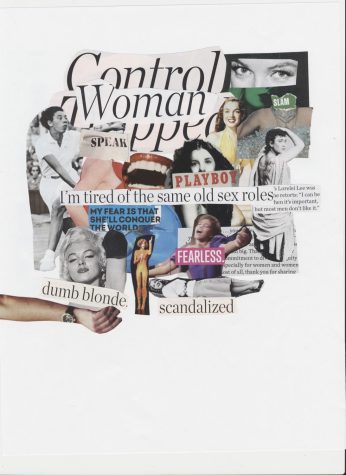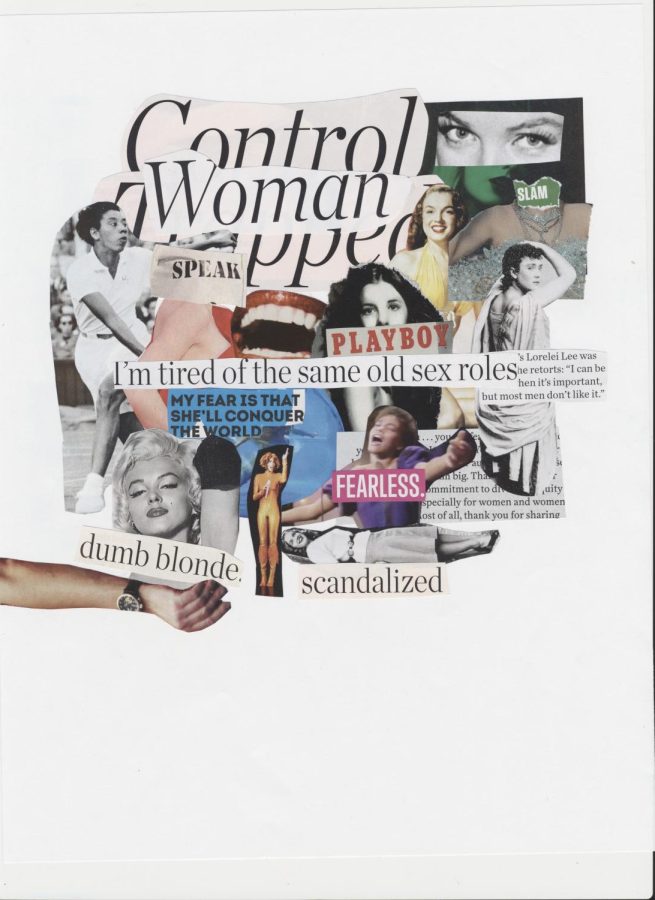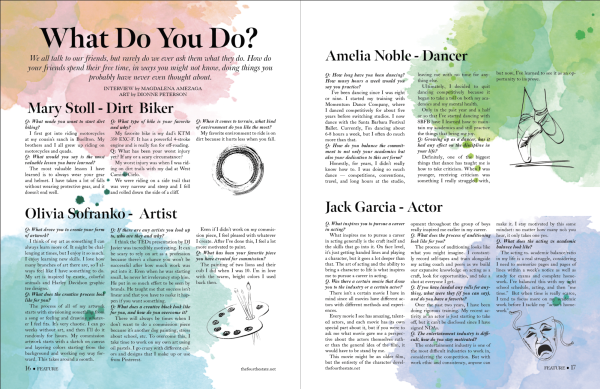Fearless Femininity
Women are forced to deal with sexualization and discrimination simply because of their gender; women are viewed as inferior to men both in the workplace and society in general.
April 29, 2024
If one were to sit down and flip through the overpriced and extensive paged history books that every student buys at some point in their high school career, they would find only a handful of pages that mention women. And of that handful, only a quarter specifically feature the issues of women’s rights.
Since the beginning of time, women have been “submissive” and sexualized beings, especially in the workplace. The media distorts women and leaves a path for future generations to do the same. “There is a fear of women’s empowerment.” says History teacher Dena Montague when asked why this cycle of oppression manifests with each generation. Society has taken to heart this cycle of undermining the power that women could obtain if it were not for the vicious stereotypes that breed over time.
In the workplace, women are “too emotional” to be in charge of anything important. In the media, women are perfectly shaped goddesses with air for brains. In the acting industry, female actors’ salaries are 1.1 million dollars less than their equal male co-stars. And all because of what? Because women have different bodies than men? Because of the difference between estrogen and testosterone? Because women have reproductive systems?
There is no sense in those explanations. The answer is this: there is no worthy reason why women are less fit than men regarding intellect, emotion, or performance. Women have played the role of passive mothers and submissive wives for centuries because of stereotypes that genuinely have no essence.
In the late 1960s, women began to take on male-dominated roles in labor due to wartime; from here, a silent uprising transformed, placing women in the workplace on normality, but not without the evolving discrimination. Throughout time, women were considered less important than men. They were “unintelligent”, they were not allowed to work, and their only roles in society were domestic. Women were considered property, to be owned, governed, and controlled by any male figure in their life, whether a husband or father. As the human population evolved, women slowly began to demand and gain rights, and they eventually entered the traditional work roles meant for men during WWI.
In today’s society, STEM professions are still male-dominated, and many women face sexualization and discriminatory remarks and actions simply because of their gender. In male-dominated fields, numerous women have reported dealing with gender discrimination. Including dealing with double standards, exclusion from important meetings, being passed up for promotions, and being more harshly evaluated than male colleagues. There is constant pressure on working females to be perfect because, often, they are judged harsher than men. If a woman speaks up for herself, she becomes “bossy” or a “bitch”.
“To say I want my rights is seen as negative in today’s society as though you are a man-hater,” says Montague. If a woman does not speak up for herself, she is “weak” and submissive. There is no justifiable reasoning behind the double standards society created for men and women, yet it is still present in daily life.
“It’s everywhere,” says Montague, addressing misogyny in present-day society. “It’s a question of men and women to see if things are going to progress. It shouldn’t be the burden of women to always struggle to say this is a problem and we need change.”
In professions such as engineering, the assumption is that a female in this profession does not know what she is doing and, therefore, must require male help. Many women have experienced their male colleagues “checking up on them”, leading to “mansplaining”, a condescending way for a man to try to prove to a woman that he is more intelligent.
As if this is not enough, many women have to deal with sexualization within the place they work. 35% of women in corporate America reported being sexually harassed by their male colleagues, and 55% of women in senior leadership are sexually harassed.
“At my previous school, I had to report one of my colleagues for harassment. He was a male colleague and was getting too familiar. After years of feeling uncomfortable, what finally made me report his behavior to the head of school, was that he had gone far down in my social media and found a photo of my husband and me, and I was in a bathing suit. And he showed it to me and said, ‘you look really beautiful’. Him finding that meant he was deep searching through my social media, and that made me very uncomfortable,” says Head of Upper School Melissa Alkire.
This concept of sexualization within a workplace is unacceptable, yet most companies ignore the complaints from women, with complete disregard for the “no sexual harassment policy”. Few women even report incidents of sexual harassment, for worry of demoting their status as a professional due to patronizing remarks from their male colleagues and being seen as “dramatic” or “too emotional”.
“I didn’t report him earlier because I was afraid. I was a young teacher who was grateful for my job, and he had more authority in the community than I did. But after I reported him, there were other women who thanked me, because they wanted to report him too,” says Alkire.
In the present day, men and women “have” equal rights, but this is not the case. Fifty years ago, Congress approved the Equal Rights Amendment, yet it is still not a part of the Constitution. This concept of falsified equal rights is true to the wage gap in the United States and the world. “The wage gap between women and men is still a persistent problem. You’re seeing a higher rate of women going into higher education, graduating, doing better in school, but still when they enter the workforce they are getting paid less and not moving up the ladder,” says Montague.
Globally, men receive $172 trillion more than women per year, and in the U.S., women’s salaries are about 17% less than men’s yearly. In Hollywood, the wage gap between men and women is $1 million. There is no reasoning behind this other than the gender difference. There are many theories as to why women are marginalized in society, but one of them includes their ability to have children.
“One of the many reasons is our reproductive nature. There is a moment in time, should a woman choose to have a baby, when her ability to participate in work becomes compromised and shifted. We, as a society, do not provide structural support, care, or consideration, and then we expect women to return to work. We don’t have systems or structures that help women re-enter the work system,” says Alkire. There’s a lack of a “safety net” in America for women and mothers, explains Montague. “Usually it’s the women that stop their career. There’s a whole stigma over mothers belonging in one role as the housekeeper and child bearer. There’s a lack of support for child care and maternity leave.”
But why are women still being paid millions of dollars less than men while also getting no support during maternity? Simply because of the incredible ability to bring a new life into the world? Because of the need to take time off to raise their child? What justification is there for this? The answer is none. There is no justifying why women are still paid less than men when they work just as hard, if not twice as hard, as men. And why should what we were born with determine our worth in society? We have passed the era of men being “superior” to women, and it is time for equal rights to become a reality instead of a thought. “Women are extraordinary. I think with all of the burdens women have to deal with in society, we are still thriving, which says a lot. Imagine if those barriers were taken down.”
women have to deal with in society, we are still thriving, which says a lot. Imagine if those barriers were taken down.”
















